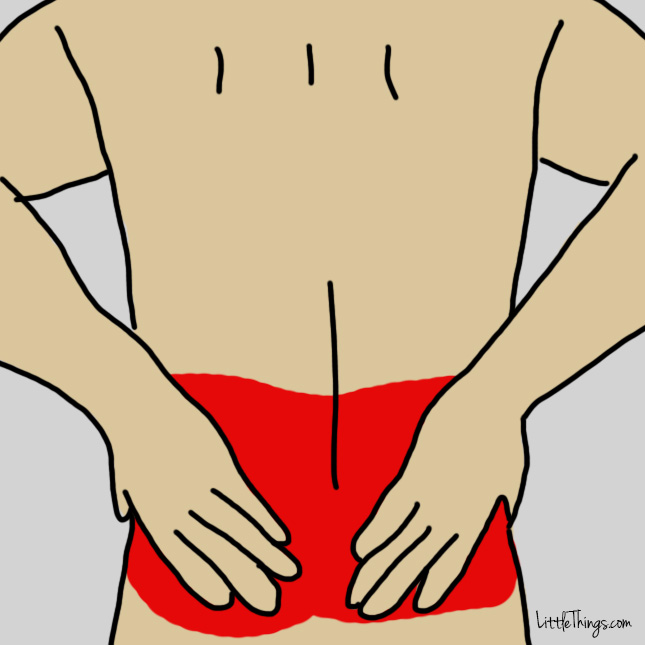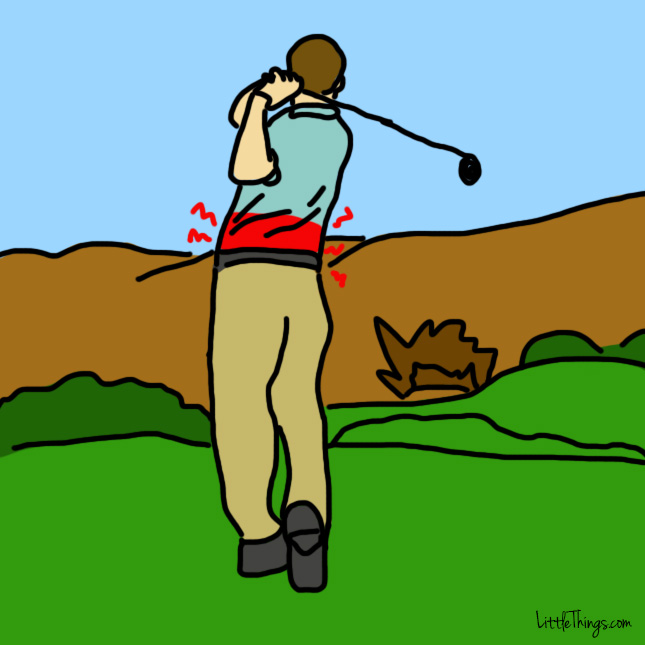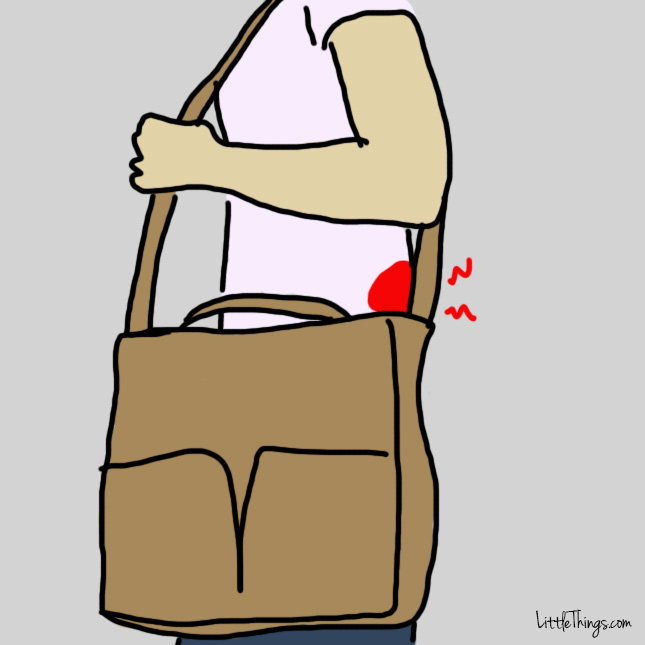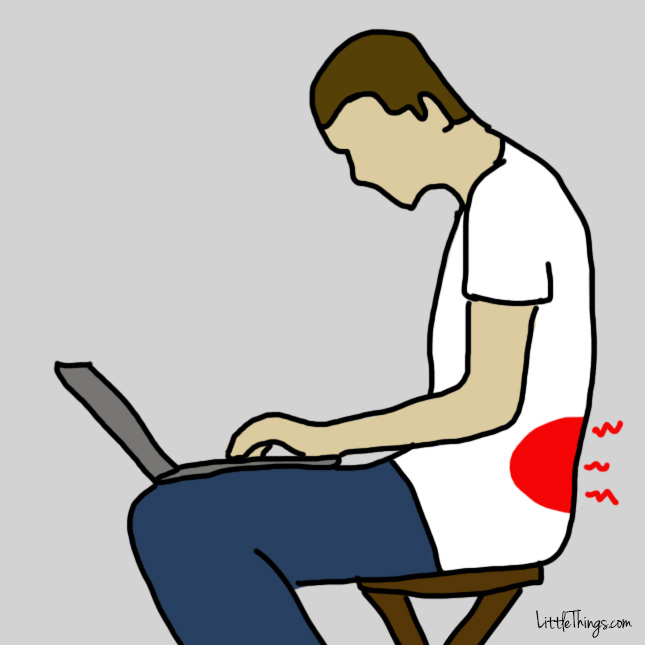I always thought that pain was just a part of life. But does it really have to be?
According to the American Chiropractic Association, 31 million Americans experience lower back pain, and we spend $50 billion each year trying to resolve the problem.
If you're a long-time sufferer like I am, you know that your lower back pain is not the result of a serious condition like inflammatory arthritis, infection, fracture, or cancer. It’s something else entirely. It almost feels like some little thing I’m doing in my everyday life might be causing the problem — but I have no idea what it is.
If you’ve had this thought as well, you’re on to something. Though we’ve taught you how to reduce pain temporarily with simple stretches you can do in a chair, it’s not a permanent fix. The only thing you can really do to fix this problem is be aware of what is causing the pain and how you can counter it to finally make the discomfort go away — forever.
In this LittleThings exclusive, we break down what causes lower back pain and what tiny things we can do to get the big relief we all deserve…
Do you know what could be causing your lower back pain? Scroll down to learn some of the potential causes!

We all have lower back pain at some point, so we know what it feels like. But what exactly is it?
The pain occurs in the lumbar region, which is the part of your body that starts below the ribcage, and the sensation can feel like anything from dull ache to a shooting or stabbing sensation. Lower back pain can come suddenly, or it can sneak up on you slowly. Many times, lower back pain often gets better on its own — but if it doesn’t, what’s causing it?
Cause #1: Your Job

Some jobs seem like they’d be obvious culprits for lower back pain, like construction, landscaping, or warehouse jobs. But some jobs don’t seem as obvious, like a desk job where you tend to slouch or hunch over a computer. Other occupations that are at risk include nurses, surgeons, pilots, servers, bus drivers, and teachers of small children who have to bend down and get up often.
If you have an inactive job…
- Move! Get up and walk a little every hour. It can be as simple as getting up to get a glass or water to taking a stroll around the block.
- When getting up from a sitting position, scoot to the edge of your seat, make sure your feet are directly underneath you, and stand. Try not to bend at the waist.
- Make sure your chair has good lumbar support or use a pillow or rolled-up towel for support.
- Rest your feet on a low stool.
If you have an active job…
- Think and take your time before lifting something.
- Test the weight of something before you lift it.
- Put your feet shoulder width apart, tighten your stomach muscles, and get a firm grasp before lifting anything.
- Bend at your knees instead of your waist.
- Lift with your legs and not your back.
Cause #2: Your Exercise or Recreation

Overdoing it at the gym, golf course, basketball court, or even weeding in the garden is the most common cause for sudden lower back pain. Sure, all the strain you’re putting on your body can make you look great, but it’s also make you feel lousy.
Overextended muscles lead to low back pain, and you’re even more vulnerable if you tend to be inactive during the week — then spend hours playing tennis or horseback riding on the weekend.
If you feel like this may be the reason for your pain, try some gentle stretching after your workouts. Make sure every part of your body, both lower and upper, get good long stretches that all last 10-20 seconds each.
It’s also wise to listen to your body, so if you’re forcing yourself to go to the gym, although you feel sore, try to do a mild workout until your body adjusts.
Cause #3: Your Bag

Believe it or not, your lower back supports your upper body. So even if you wear your backpack, purse, tote, or briefcase over your shoulder, your lower back is still supporting it.
A heavy and overstuffed bag carried daily can really put a lot of strain on your lower back over time. If you have to tote a heavy bag regularly, consider wheeled options like a cart or a wheeled briefcase.
Cause #4: Your Posture

You may have rolled your eyes as a kid when your mom said, "Stand up straight!" But she was right.
Your back supports weight much better when you don't slouch. Remember, the lower back supports the upper part of your body, so if you're adding additional weight to your upper body, your lower back picks up the slack.
Always try to find a place to sit, and when standing, make sure your body is aligned. You know you’re aligned when your joints are stacked upon each other — the ears are over the shoulders, ribs are over the hips, and your hips are over your heels. Your butt, chest, or hips are not jutting out.
Also, according to American Chiropractic Association, crossing your legs and sitting in the same position too long doesn't help, either.
Cause #5: Herniated Disc

If any of the above applies to you on a regular basis, you may get a herniated disc. But what exactly is that?
Gel-like discs cushion the vertebrae in your spine. Sometimes these discs suffer wear and tear from injuries or aging, and a declining disc may bulge or rupture, which puts pressure on the spinal nerve roots and causes intense pain.
Cause #6: Lounging

We all need to relax, read a book, or catch up on our favorite TV shows. And when your back REALLY hurts, it feels like a perfect time to lie on the couch or your bed and do just this.
Yet, if you have back pain due to muscle strain, doctors recommend returning to your more active activities as soon as possible.
“Studies suggest that any more than a day or two of bed rest can actually make the pain worse and may reduce muscle tone and flexibility,” according to WebMD.
Also, those who are inactive tend to have lower back pain more often than those who are active.
If you aren’t a sporty type, don’t fret! Daily walks, bike rides, and even light yoga can help leaps and bounds without making you break into a massive sweat.
Cause #7: You're Not Stretching Enough

Did you know that a study found that people who took three months of yoga classes had less lower back pain than people who were trying other methods? The benefits even lasted for several months AFTER the classes were finished. Conventional stretching also works just as well.
If you’re not flexible, though, stretching can seem intimidating. But did you know the best stretches for your lower back can be done in the comfort of your own bed? Try any of these three tonight before you go to bed:
Two-Knee Twist: Lay on you back and bend your knees. Back you arms and stretch them out to your sides. Then let your knees collapse to your right side. Count to 30, then shift them to your left side, and count to 30 again.
Sphinx: Lay on your belly. Bed your arms but keep your forearms glued to the floor (or bed), then lift your upper body, feeling a nice stretch in your lower back.
Thread the Needle: Lay on your back and bend both your knees. Take your right ankle and place it on top of your left knee, making a “4” figure. Lift your left leg and bring your knee towards your face. Thread your arms through the gap between your legs and the outside of your right thigh and count to 30. Once done, repeat on the other side.
Cause #8: Your Problem is Internal

If none of these causes seem to be fitting the bill, your problem may be due to something happening inside your body rather than what you’re physically doing. These conditions can include spinal stenosis, spondylitis, and fibromyalgia.
Remember, if you have chronic back pain that lasts more than 72 hours, it’s always wise to see a doctor.
Do you have a surefire trick that helps you relieve back pain? Let us know in the comments below!
Please SHARE and help those in pain heal quicker!




